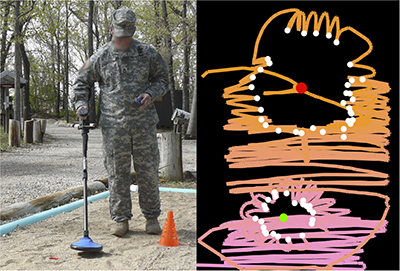 There is a limit to what we can accomplish with one-size-fits-all
design. For one thing, by trying to be everything to everyone,
many products become bloated and ultimately lose a lot of their
usefulness. The
Wenger 16999 Swiss Army Knife (see image to the right)
provides an amusing illustration of this point. But the problem
is even deeper than feature creep and bloat. One-size-fits-all
design inadvertently, but inevitably leads to discrimination: User
interfaces designed with able-bodied users in mind, even if they
are technically `accessible', are inefficient for many impaired
people to use not because of any inherent barriers to efficient
interaction, but because of the mismatch between the user's
effective abilities and the designer's assumptions. Interfaces
designed with Western aesthetic sensibilities in mind, will appear
less trustworty, engaging or usable to people from other cultures
potentially causing them not to take advantage of valuable digital
resources. As
our study of Doodle users shows, people in
different cultures perform social decision making tasks
differently.
There is a limit to what we can accomplish with one-size-fits-all
design. For one thing, by trying to be everything to everyone,
many products become bloated and ultimately lose a lot of their
usefulness. The
Wenger 16999 Swiss Army Knife (see image to the right)
provides an amusing illustration of this point. But the problem
is even deeper than feature creep and bloat. One-size-fits-all
design inadvertently, but inevitably leads to discrimination: User
interfaces designed with able-bodied users in mind, even if they
are technically `accessible', are inefficient for many impaired
people to use not because of any inherent barriers to efficient
interaction, but because of the mismatch between the user's
effective abilities and the designer's assumptions. Interfaces
designed with Western aesthetic sensibilities in mind, will appear
less trustworty, engaging or usable to people from other cultures
potentially causing them not to take advantage of valuable digital
resources. As
our study of Doodle users shows, people in
different cultures perform social decision making tasks
differently.
I argue that personalized and adaptive user interfaces are one way to accommodate these individual differences and, thus, to provide more equitable access to digital resources.


 Projects
Projects
 We have built an interactive visualization system, callded PETALS, that helps novice deminers learn how to correctly
identify dangerous cluster configurations of landmines. We conducted a controlled study with two experienced
instructors from the Humanitarian Demining Training Center (HDTC) in Fort Leonard Wood, Missouri and 58 participants,
who were put through the basic land mine detection course. Half of the participants
had access to PETALS during training and half did not. During the final exam, which all participants completed without
PETALS, participants who used PETALS during training were 72% less likely to make a mistake on the cluster tasks. These results
are not yet published, but the available papers capture the initial development and evaluation of the PETALS system.
We have built an interactive visualization system, callded PETALS, that helps novice deminers learn how to correctly
identify dangerous cluster configurations of landmines. We conducted a controlled study with two experienced
instructors from the Humanitarian Demining Training Center (HDTC) in Fort Leonard Wood, Missouri and 58 participants,
who were put through the basic land mine detection course. Half of the participants
had access to PETALS during training and half did not. During the final exam, which all participants completed without
PETALS, participants who used PETALS during training were 72% less likely to make a mistake on the cluster tasks. These results
are not yet published, but the available papers capture the initial development and evaluation of the PETALS system.